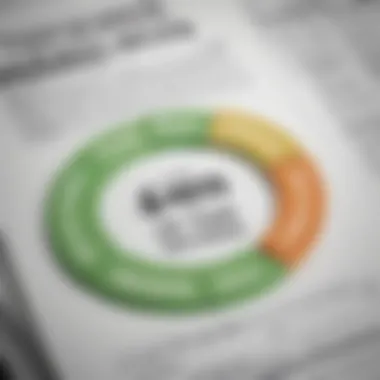Navigating Free Tax Filing with H&R Block: A Guide


Intro
Navigating the world of taxes can often feel like traversing a labyrinth. When it comes to tax filing, many individuals seek avenues that allow them to save money while ensuring they meet compliance requirements. H&R Block presents an opportunity for those looking to file their taxes for free. In this article, we will take a closer look at how you can utilize H&R Block’s offerings—why might this be your best course of action and what you need to know to make an informed choice.
Running the tax filing gauntlet isn’t easy, and many people fear getting it wrong. With so many options available, the process can quickly become both intimidating and confusing. However, understanding what tools and resources are at your disposal is key to navigating this ecosystem smoothly. Together, we’ll break down the relevant details surrounding H&R Block’s free filing options, highlighting eligibility criteria, the features they offer, and the comparisons with their competitors.
This effort isn’t solely about presenting facts; it’s also an endeavor to clarify any misconceptions and provide clarity on the implications of choosing free versus paid services. It’s important to decipher these decisions as they can have lasting ramifications on your financial standing. So, let’s roll up our sleeves and dive into the world of free tax filing with H&R Block.
Understanding the Free Tax Filing Concept
In today's financial landscape, the notion of filing taxes for free is becoming increasingly relevant. This article dives into how individuals can leverage services like H&R Block to file their taxes without incurring costs. It's important to grasp the underlying concepts of free tax filing, as it impacts both finances and time management.
The cornerstone of free tax filing is its accessibility to a broad demographic. Many taxpayers assume that high-quality services come with a hefty price tag, but that's not necessarily the case. Understanding the free filing concept helps demystify some of these services and encourages individuals to take advantage of the options available to them.
The Legal Framework for Free Filing
The legal frameworks surrounding free tax filing are quite robust. The IRS offers various programs aimed at assisting low to moderate-income taxpayers, multifaceted aspects of which are worth noting:
- Qualified Programs: The IRS promotes the Free File program, allowing eligible taxpayers to access certain tax preparation software without cost. Many providers, including H&R Block, participate in this initiative.
- Regulations and Requirements: To qualify for free filing, taxpayers must often meet specific income thresholds. It's vital to understand these limits, as misinterpretation can lead to overestimating or underestimating eligibility.
- Compliance Considerations: While free filing options are available, taxpayers must ensure they are in compliance with IRS mandates. Filing incorrectly, even if using a free service, can lead to unforeseen complications.
Understanding the legal context provides a solid foundation upon which taxpayers can build effective filing strategies.
Basic Principles of Free Tax Preparation Services
Grasping the basic principles of free tax preparation services enables taxpayers to navigate the landscape more effectively. Here are some intrinsic aspects:
- Mission-Driven Approach: Many services like H&R Block offer free filing with a mission to assist and support community financial literacy. These companies operate not purely for profits but to empower taxpayers.
- User-friendliness: Most platforms intend to simplify the filing process. Typically, they come equipped with intuitive interfaces, guiding you through each step. Users can often quickly customize their experience based on their unique tax situations.
- Support Resources: In the case of H&R Block, it’s not just about the software. They frequently provide access to a wealth of educational resources and customer support options to help taxpayers succeed without breaking the bank.
Grasping these principles allows individuals to utilize their free resources to the fullest, ensuring not only compliance but also a positive tax filing experience.
"Education is the most powerful weapon which you can use to change the world." - Nelson Mandela
Overview of H&R Block Services
Understanding the offerings of H&R Block is crucial for anyone considering free tax filing options. As a well-established entity in the tax preparation industry, the services they provide go beyond just basic tax filing. They aim to cater to a wide audience, from individuals with simple returns to those with more complex tax situations. Offering both in-person and online services allows clients the flexibility to choose what fits their needs best.
The key elements that set H&R Block apart include their strong brand reputation, a rich history in tax preparation, and an array of service options tailored for various clientele. This reliability is especially significant during tax season, when stress levels can run high. Having a trustworthy partner in H&R Block can ease that burden, allowing individuals to focus on other pressing matters.
History and Reputation in the Industry
H&R Block was founded in 1955 in Kansas City, Missouri, by brothers Henry and Richard Bloch. Their initial vision was to provide a simple way for citizens to file taxes. Over decades, the company has built a formidable reputation as a leader in tax services. As of today, it operates thousands of offices across the United States and serves millions of taxpayers annually, including those seeking free filing options.
This long-standing presence in the tax preparation landscape reflects not just industry knowledge, but a commitment to evolving with changing tax laws and technology. Many users feel reassured knowing they are dealing with a company that has weathered numerous economic changes and has continually put the customer's needs at the forefront. Such a reputation can significantly influence a taxpayer's decision when it comes to where to get assistance.
Service Offerings: A Comprehensive Breakdown
H&R Block has tailored its offerings to suit diverse tax filing needs. Some of the significant services include:
- Free Tax Filing for Simple Returns: Their no-cost option covers basic tax situations, making it accessible for low-to-medium income earners.
- Online Tax Software: The platform offers various tiers, from a self-service model to enhanced features with additional support.
- In-Person Assistance: For those who prefer human interaction, H&R Block has offices staffed by certified tax professionals who can help with any questions or concerns.
- Tax Refund Advances: In some cases, clients may qualify for a refund advance, which gives them access to funds before their tax returns are processed.
In addition to these services, H&R Block provides various resources, including articles on tax topics, calculators, and community forums, ensuring clients are educated and well-informed.
"Choosing the right service provider can make all the difference in your tax filing experience."
Overall, the multitude of options available position H&R Block as a strong candidate for any individual looking to navigate free tax filing.


For more detailed information on H&R Block's history and services, you can visit Wikipedia.
Their combination of experience and variety of offerings illustrates their mission to not only provide tax services but also to support individuals in achieving financial literacy.
Eligibility and Requirements for Free Filing
When it comes to tax filing, understanding eligibility and requirements for free services is crucial. Many individuals overlook these facets, assuming they qualify without doing their homework. This misconception can lead to wasteful time spent or even potential fees that could have been avoided.
Free tax filing services like those offered by H&R Block provide a valuable opportunity for taxpayers to keep more of their hard-earned money. However, this convenience isn’t available for everyone. Knowing the specific criteria is essential for maximizing the benefits of these services.
Income Thresholds and Limitations
One of the primary elements that govern eligibility is the income threshold. H&R Block typically sets a cap on the income level to qualify for their free filing option. For instance, individuals with an adjusted gross income of $100,000 or less might find themselves eligible. This number might vary based on specific criteria set by the service provider, and it can also differ from state to state.
It’s important to keep in mind:
- Income Types: Different types of income may be counted toward the threshold. Wages from jobs might fit, but income from self-employment often complicates things.
- Filing Status: Those filing as head of household or married also need to be aware. The threshold may be lower compared to single filers.
Another limitation to consider is whether the taxpayer is eligible for certain tax credits. If one is claiming credits such as the Earned Income Tax Credit (EITC), additional factors could come into play, altering qualifications for free filing services.
Types of Returns Eligible for Free Filing
Next, let’s dissect the types of tax returns eligible for free filing with H&R Block. Knowing which forms can be filed for free is just as important as knowing income limits.
- 1040EZ: This simplified form is often a staple for those with uncomplicated tax situations. It’s quick to fill out and serves basic tax filing needs well.
- 1040A: Individuals with dependents or certain tax credits might use this form. While more complex, it still generally falls under the free filing category for many.
- Standard Returns: Most standard individual returns also qualify, as long as they adhere to income limitations.
What's vital here is that not all returns qualify. For example, if you're filing for business income taxes or rental properties, the free filing option likely goes out the window. Therefore, it is wise to assess your specific tax situation carefully before deciding on a free filing route.
In hindsight, ensuring that you know these eligibility requirements can spare taxpayers both time and frustration. This knowledge allows for a more streamlined experience with H&R Block's free tax filing services, effectively setting one up for success before they even begin their filing journey.
Comparative Analysis of Free Filing Options
When individuals consider filing their taxes for free, it becomes essential to analyze the options available in the marketplace. A comparative analysis of free filing options, particularly focusing on H&R Block, sheds light on the various services, benefits, and elements to consider. This algebra of choices between different tax filing platforms can greatly shape one’s experience during tax preparation.
H&R Block versus Other Major Platforms
H&R Block has established itself as a key player in the tax preparation arena, but how does it stack up against its competition? When placing H&R Block side by side with rivals like TurboTax and TaxSlayer, a few critical elements emerge that are worth examining.
- User Experience: H&R Block stands out with its user-friendly interface. The design aids in easy navigation, and its features tend to be intuitive. This is a significant factor when you consider the stress that often brings during tax season. TurboTax also offers a polished user experience, but some might find its nagging ads a bit irritating during the process.
- Support Options: H&R Block provides a distinct advantage with its in-person support. While both H&R Block and TurboTax offer online support, H&R Block allows you to walk into a brick-and-mortar store for face-to-face assistance. This can be quite reassuring for those who prefer personal interaction.
- Features Available: The range of features between H&R Block’s free tier and those of competitors might differ. H&R Block allows free filing for simple returns while TurboTax's free option is slightly limited. Users should carefully look into the specifics of each platform’s free service offers, particularly what forms are available for free, as it can impact the overall filing experience.
- Learning Resources: H&R Block includes a wealth of resources for users looking to educate themselves on tax laws. Their resources cover various tax topics, helping individuals stay informed. Comparatively, while TurboTax offers similar resources, they often tuck the information away, making it less accessible for users.
Across these platforms, finding what fits best for your tax situation is crucial. Understanding the nuances can sometimes mean the difference between frustration and comfort in what can be a daunting task.
Evaluating Cost-Effectiveness
In the realm of tax preparation, cost-effectiveness isn't merely about the price tag; it encompasses the value you derive from the service provided. When evaluating H&R Block in this light against its competitors, it is important to weigh several factors that feed into the decision-making process:
- Upfront Costs vs. Long-term Savings: H&R Block's free filing can be exceptionally cost-effective for straightforward situations, like filing 1040-EZ forms. However, if you find yourself needing more features later on, consider what those costs might look like with add-ons. TurboTax also markets freebies but can get pricey when one needs additional support.
- Refund Guarantees: Both H&R Block and TurboTax typically offer guarantees on maximum refunds. However, paying attention to the specifics of these guarantees, including any potential fees deducted from refunds can be pivotal. H&R Block has a solid reputation for easing concerns around file inaccuracies as well, followed up by their reinforcement of full refund guarantees should mistakes arise from their service.
- Real-time Calculations: A noteworthy mention is the real-time calculation feature that both platforms provide. H&R Block does well in keeping calculations straightforward, giving users a clear overview of potential refunds or taxes owed without computing a hidden surprise at the end.
Ultimately, weighing these elements can help turn the murky waters of free tax filing into a clearer picture, guiding clients toward informed decisions that align with their financial goals. In a world where each penny counts, evaluating cost-effectiveness can make a world of difference in navigating tax time peacefully.
"In tax preparation, sometimes the free option may carry hidden costs. Always read the fine print!"
Whether gravitating towards H&R Block or any entry in the tax prep realm, detailing pros, and cons will elevate one’s filing experience to heights that are beneficial.
Navigating the H&R Block Free Filing Process


In the world of tax season, knowing how to maneuver through the free filing landscape can be a game changer. This section digs into how to successfully use H&R Block’s free filing services to your advantage. The benefits of this process are significant; it not only saves you precious money but also reduces stress as you prepare for tax season. Understanding the steps and considerations will empower you to file your taxes confidently, ensuring you don’t miss any deductions or credits that can work in your favor. Here’s how to get started.
Step-by-Step Guide to Filing Your Taxes
When it comes to using H&R Block for your free tax filing, it ideally boils down to a few streamlined steps:
- Create an Account: Start by visiting H&R Block’s official website. Sign up for a free account by providing your email and creating a password. This step opens the door to a straightforward filing process that can save you a lot of time.
- Gather Your Documents:
Compile all necessary documents such as W-2 forms, 1099s, and any other applicable financial records. Having these on hand makes the whole process smoother. It’s like having a roadmap before a long journey; it helps you stay on track. - Answer Essential Questions:
H&R Block’s software will pose a series of questions to assess your tax situation. Be honest and thorough in your responses. This part is crucial as it determines what kind of deductions and credits you may qualify for. - Review and Optimize Your Deductions:
Once you’ve entered all your information, H&R Block will analyze your details to ensure you are not missing anything. Take the time to review this section carefully, as tax deductions can significantly alter your final tax bill. - E-File Your Return:
After confirming all your data is correct, the final step is to e-file. This quick process often results in faster refunds than traditional filing methods. - Track Your Refund:
Most importantly, once you’ve filed, you can track the status of your refund directly through H&R Block’s website. Keep an eye out; it’s nice to know when your money is on the way.
This process is crucial, as even a small misunderstanding can lead to complications. By breaking it down into these steps, H&R Block makes tax season feel a bit less daunting.
Common Challenges and How to Overcome Them
Navigating the tax filing process can sometimes feel like walking through a minefield, especially for first-timers or those unsure about their financial situation. Here are a few common hiccups and strategies to deal with them:
- Missing Documents:
It’s easy to overlook a critical document. If you find yourself in this situation, do not panic. Check with your employer or financial institutions promptly for reissued forms. Alternatively, the IRS can provide copies of prior tax returns if necessary. - Technical Glitches:
Online filing systems aren’t perfect. If the software crashes or you encounter an error message, breathe. Save your progress often, and try refreshing the page. If issues persist, H&R Block’s customer service is also there to lend a helping hand. - Complex Tax Situations:
If you have multiple income streams or unusual deductions, it can feel overwhelming. In this case, consider reaching out to H&R Block’s customer support or browsing their extensive online resources. - Underestimating Time Needed:
It's best to start the process early, as waiting until the last minute can increase stress levels significantly. Everyone has their own pace, so keep that in mind. Tackling your filing in stages can be a breath of fresh air.
Remember, you are not alone in this process. Numerous free resources and support are at your disposal, specifically designed to guide you through any tricky bumps in the road.
Overall, adeptly navigating H&R Block's free filing process can lead to a fulfilling, stress-free tax season, setting you up favorably for the financial year ahead.
Assessment of User Experience
Interface Usability and Design
A well-designed interface can make or break a user's interaction with a service. H&R Block’s online platform prioritizes simplicity and clarity, providing intuitive navigation tools that help users find what they need without feeling drowned in digital noise. The dashboard is uncluttered, aligning all necessary functions right where most folks would naturally look first.
Features like the step-by-step walkthrough not only help inexperienced users but also prevent seasoned filers from drifting off course. Important reminders and prompts guide users through critical submissions, effectively reducing the risk of omissions, which can lead to issues down the road. If a user feels lost, the chances of accurately completing the tax filing diminish significantly.
Some users might raise the point that while the visual appearance is appealing, practical functionality is the heart and soul of any platform. H&R Block’s interface strives to balance aesthetics with utility, offering features like customizable profiles and progress tracking which can aid users in managing their filing process efficiently.
Another noteworthy element revolves around accessibility. The interface adapts well to various screen sizes, whether on a desktop or a smartphone. This versatility means that users can complete their taxes on the go, which is a significant consideration in today’s mobile world.
Customer Support and Resources
Even the best-designed interface cannot cover every scenario; thus, robust customer support is vital. H&R Block offers various channels for assistance, ensuring help is just a click or call away. From live chat options to phone support and FAQs, they cater to different user preferences and needs.
If a filing question arises, users can directly connect to live agents who are trained to handle tax-related queries. This ability to interact with a knowledgeable representative can alleviate much anxiety surrounding the filing process. Even the most astute taxpayer occasionally has queries that an automated system can't address comprehensively.
Moreover, H&R Block provides a wealth of resources. The online library includes a series of articles, video tutorials, and guides, all designed to enrich the user's understanding of tax processes and available deductions. For many, navigating tax codes can feel like learning a new language, and H&R Block aims to demystify this with accessible content tailored for non-experts.
Tax Filing Outcomes: What to Expect
Understanding what comes after submitting your tax filing can be just as crucial as the filing process itself. Knowing the typical outcomes helps individuals plan better, ensuring they are well-prepared for what lies ahead. This section addresses key elements like processing times, potential refunds, and compliance considerations. As the saying goes, "An ounce of prevention is worth a pound of cure!" This approach becomes key when anticipating the ramifications of your tax returns, especially when utilizing free filing services like those offered by H&R Block.
Processing Times and Refunds
When you file your taxes, time is often of the essence. Folks want to know: how long will it take to process my return? With H&R Block's free filing service, processing times are generally in line with industry standards. Usually, refunds could appear in your bank account in about 21 days if you choose direct deposit and have not hit any roadblocks. However, factors can influence this timeline, including:
- Accuracy of Your Return: Any errors can slow things down.
- Complexity of Your Tax Situation: More complicated returns may require additional review.
- IRS Backlogs: Sometimes, external factors, like government shutdowns or tax season rush, can prolong processing.
It's wise to keep all your receipts and documents organized, making it easier should the IRS raise an eyebrow during their review. To put it simply, the more prepared you are, the smoother the process tends to be.
In case a refund is expected, understanding the system can alleviate anxiety. Refunds can be a welcome surprise or a well-deserved credit, so keeping tabs on your return is prudent. H&R Block provides more than just a chance for free filing; they also facilitate tracking your refund status. You can stay informed about when your refund is being processed, giving you peace of mind as you wait.
Compliance and Audit Considerations


While the thought of audits often sends shivers down a taxpayer’s spine, it’s important to keep in mind that accurate and compliant filings significantly reduce that risk. When engaging with free services like those from H&R Block, users must ensure they grasp the specifics of tax laws applicable to their situation.
Moreover, here are a few tips to maintain compliance:
- Double-Check All Entries: An oversight on entries could trigger an audit.
- Keep Personal Finance Records: These can be instrumental if you're ever questioned.
- Understand Deductions and Credits Available: Some might overlook valuable credits and deductions, potentially leading to inaccuracies.
So what's the takeaway in regard to compliance? Being forearmed is being forewarned. You could be flying under the IRS radar if you play your cards right.
"It's not about filing a return; it's about filing the right return that stands scrutiny."
Embrace the learning curve that comes with any free service, and remember that maintaining tax records and understanding potential audit triggers leads to a more confident filing experience.
By investing time in comprehending both processing times and compliance elements, you'll be better poised to navigate the intricacies of tax filing without incurring unnecessary headaches.
Future of Free Tax Filing Services
Understanding the future of free tax filing services is very important in a world where technology and consumer expectations are rapidly evolving. This aspect not only informs taxpayers about potential savings but also sheds light on how companies like H&R Block are adapting to meet new demands in a digital economy. Free services, particularly in the tax domain, can be a game changer for many individuals and families who already feel the pinch of financial burdens.
With rising living costs, accessing effective and free tax filing options has become a priority for many. Taxpayers from various backgrounds, especially students and low-income households, stand to benefit greatly from these services. Insights into future trends may help taxpayers navigate available options and make informed decisions, fostering trust in financial institutions that provide support when needed.
Another key element in the discussion of the future of free tax filing is the increasing integration of technology. By analyzing how technology affects accessibility, we gain a clearer picture of where this service may head.
Trends in Tax Technology and Accessibility
Technology continues to refine and redefine how taxpayers approach their filing responsibilities. One might notice a growing emphasis on user-friendliness as services strive to make tax preparation accessible to all. Not only do taxpayers seek quick solutions, but they also look for platforms that allow them to manage their tax obligations without a steep learning curve.
- Technologies such as artificial intelligence and machine learning are becoming integral parts of tax preparation tools.* These can help in calculating deductions, suggesting optimal filing choices, and even anticipating potential audit triggers. One emerging trend is the incorporation of mobile applications, allowing users to file taxes directly from their smartphones.
The ease of accessibility provided by online services allows individuals who may have had a hard time managing tax obligations in the past to step up to the plate with confidence. As more citizens gain digital literacy, the expectation becomes that tax platforms will offer increasingly sophisticated capabilities, ranging from tailored advice to automated alerts for deadlines. This democratization of tax preparation is a crucial factor in making tax filing not only free but also achievable for a broader audience.
Predictions for H&R Block's Role in the Market
Looking ahead, it is helpful to predict how H&R Block might position itself within this quickly evolving landscape. Given its long-standing reputation in the tax preparation space, the company is likely to push boundaries further, establishing itself as not only a provider of free filing options but also a leader in technological adaptation.
One prediction is that H&R Block will invest heavily in enhancing its online platforms, ensuring that they remain intuitive. As user experience has been a big selling point for many users, maintaining an effective interface will be paramount.
Moreover, trends point towards H&R Block perhaps expanding its partnerships with fintech companies. These collaborations may bring fresh innovations to light, such as integrating predictive analytics to provide customers with customized recommendations specific to their financial situation.
"As the future unfolds, H&R Block’s ability to blend technology with user-centric design will likely dictate its standing in the crowded marketplace of tax services."
Furthermore, with the ongoing shifts in tax laws and regulations, it is reasonable to expect H&R Block will remain a key player in providing up-to-date information and educational resources. With a foot firmly planted in both traditional and modern markets, H&R Block may redefine the term "free services," ensuring that users not only pay nothing out-of-pocket but also gain substantial value from their experience.
This overview of the future promises a progressive shift, as companies like H&R Block adapt to meet the changing needs of users, ultimately leading to a more inclusive and efficient tax filing process.
End: The Path Forward
Navigating through the murky waters of tax filing can seem daunting, but utilizing services like H&R Block offers a credible foothold for those seeking to maximize their tax benefits without the added burden of cost. In this article, we've peeled back the layers of the free tax filing process, illuminating the significant benefits and considerations that come with opting for H&R Block's free filing options. Understanding what lies ahead is crucial, not only for first-time filers but also for the seasoned tax veterans looking for a reliable alternative.
Ultimately, the importance of knowing how to maneuver through these services lies in empowerment. Knowledge is power, especially when it comes to finances. By grasping who qualifies for free filing, the various options available, as well as the procedural nuances involved, individuals find themselves on firmer ground come tax season. It’s not just about filing; it’s about understanding the implications of your choices and making informed decisions.
Essential Takeaways
- Eligibility Matters: Knowing the income thresholds and types of returns eligible for free filing through H&R Block is fundamental. Being informed can prevent potential pitfalls.
- Process Navigation: Engaging with the filing process through H&R Block is straightforward. Their user-friendly platform, combined with step-by-step guidance, minimizes the stress that often accompanies tax filing.
- Support and Resources: H&R Block provides ample customer support and resources. From FAQs to live chat options, taxpayers have multiple avenues to seek help when needed.
- Comparative Analysis: It’s wise to compare H&R Block’s offerings with competitors. With an understanding of what each platform brings to the table, you can make a more educated choice that aligns with your tax needs.
- Future Trends: Tax technology is evolving. Staying informed about the shifts in tax preparation services can provide an edge in future filings, especially as processes become more digital and automated.
Final Thoughts on Free Tax Filing with H&R Block
Free tax filing with H&R Block isn't merely a cost-saving measure; it’s a doorway to financial literacy and empowerment. It opens avenues for individuals to become proactive in understanding their financial obligations. H&R Block has carved a niche for itself in providing quality tax services, and their free filing option extends this commitment to wider demographics.
As we advance towards increasingly digitized world, it’s essential to remain adaptable, updating our knowledge base with the latest developments in tax technology and policy. With H&R Block as a partner in this journey, taxpayers can expect clarity and support throughout the filing process. If one chooses to embark on the journey of free filing with H&R Block, they wield the power of knowledge, choice, and a bit of tech-savvy – which makes managing taxes less of a chore and more of an opportunity.
In summary, this avenue of free tax filing not just alleviates financial burdens; it encourages a deeper understanding of tax implications, helps in strategic financial planning, and reflects a wise choice for individuals keen on keeping their finances in check.



